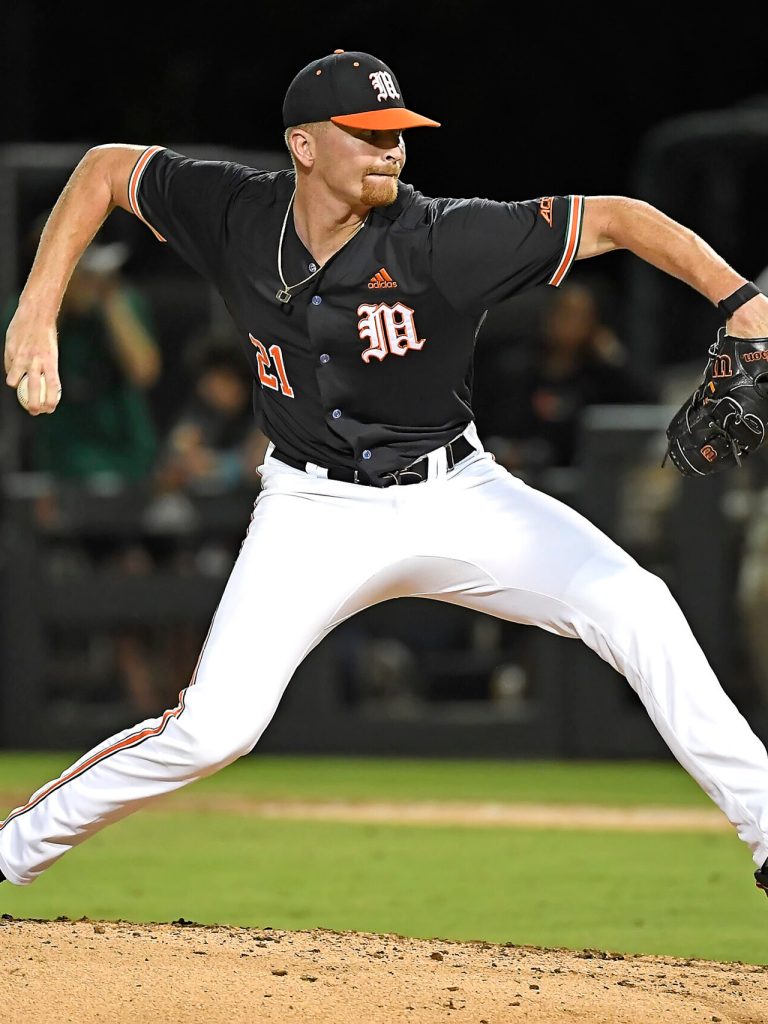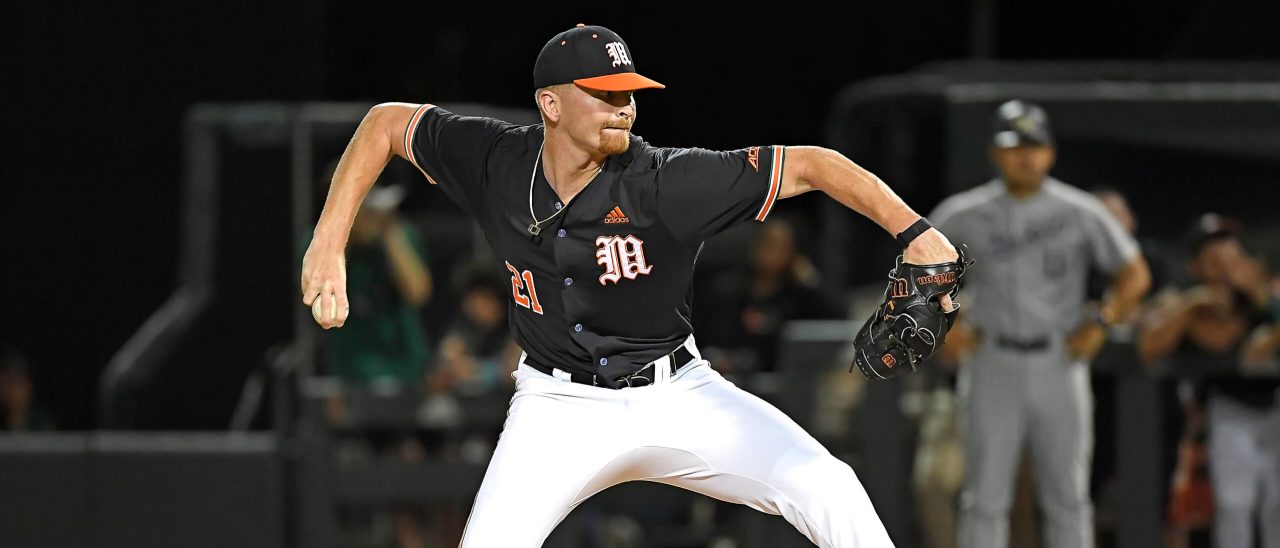The Next Orion Kerkering? Here Are 8 MLB Draft Picks Who Could Reach Majors In 2024


Image credit: Andrew Walters (Photo by Samuel Lewis/Icon Sportswire via Getty Images)
The Phillies’ Orion Kerkering ascended from a 5th-round pick with command issues to one of the best young relievers in baseball this season. It’s unusual to see a pitcher climb all the way to the major leagues in his first full season following his draft year, but it’s happened with greater regularity in recent years. Kerkering, Spencer Strider, Ben Joyce and several Angels pitchers have all made the jump from the draft to the big leagues the following season over the last three years.
Who could make the jump this year? Are there any potential Kerkering or Joyce-level talents in this year’s class that can help a big league club in 2024? Below we’ll examine a handful of pitchers who can potentially pitch in the big leagues in 2024.
It would be easy to name the Pirates’ Paul Skenes and the Braves’ Hurston Waldrep as clear candidates. However, for this exercise, Skenes and Waldrep will be excluded, as they’re well-known, highly-touted sure bets.
Instead, we’ll look at a group of pitchers with the stuff to climb the minor league ladder quickly and fit into a major league bullpen due to their quality of stuff.
Pitchers To Watch
Andrew Walters, RHP, Guardians: After three seasons of dominating out of the Hurricanes’ bullpen, the Guardians selected Walters in the second round. He averaged 15 strikeouts per nine, while allowing only 1.9 walks per nine over 102 collegiate innings, converting 26 saves. Walters’ fastball sits 95-96 mph with heavy ride and late armside break. He mixes his fastball with a hard sweeping slider in the mid-80s that generates lots of whiffs. Walters has the powerful two-pitch mix and a track record of dominating high level completion to move quickly.
Carlson Reed, RHP, Pirates: Reed spent two seasons bouncing between the rotation and the bullpen, before finding results as a full-time reliever in 2023. He struck out 60 batters over 38 innings and was one of the best relievers in college baseball. Reed mixes a two-seam fastball between 93-95 mph with a devastating mid-80s slider that generates tons of in-zone whiffs. If the Pirates decide to fast track Reed, he possesses the type of stuff that could allow him to make a Kerkering-like jump in 2024.
Levi Wells, RHP, Orioles: High octane stuff will help you move quickly, but a competitive organization looking for depth is a perfect recipe for a rapid ascent. Wells has stuff in bunches with a fastball that can sit 93-95 mph out of the pen with plus vertical break on the fastball. He uses his hard curveball to change eye levels and play off of the ride on his heater. Command has plagued Wells as a starter, and he looks like a dark-horse candidate to storm through the minors as a reliever.
Camden Minacci, RHP, Angels: This list would not be complete without at least one Angels pitcher included. Minacci was a high-energy reliever for one of the best college teams in the country over the last two seasons. Minacci could be fast tracked in the aggressive Angels system. He mixes a fastball at 92-94 mph from a low release height with flat plane and a mid-80s slider with hard cut. It’s not eye-popping stuff by any regard, but Minacci is in an organization known to push players with a track record of college performance.
Brody Hopkins, RHP, Mariners: If you asked analysts who has the best pure stuff in the 2023 college class, you might be surprised to hear quite a few name Hopkins. A standout athlete and former two-way player, Hopkins has loads of untapped potential. After totaling five total pitching appearances over his first two collegiate seasons at College of Charleston, Hopkins transferred to Winthrop before the 2023 season and made a dozen starts for the Eagles. Hopkins mixes a fastball at 92-93 mph from a low release height, a mid-80s slider with sweep and tilt and a changeup with heavy tumble and fade. The Mariners may develop Hopkins as a starter due to his three average or better pitches and athleticism. If they do decide to fast track him in the bullpen, Hopkins has low hanging fruit (athleticism and size) to add potential velocity.
Teddy Sharkey, RHP, Orioles: Few college relievers saw the success that Sharkey did at Coastal Carolina. After striking out 74 batters over 49.2 innings, the Orioles selected Sharkey in the seventh round and assigned him to Low-A after a single appearance in the Florida Complex League. Sharkey mixes a four-seam fastball at 95-97 mph with late cut, a mid-80s slider with cut and a power curveball in the 79-80 mph range with heavy depth. In his professional debut, Sharkey had whiff rates above 30% or higher across his fastball, slider and curveball in his pro debut. With a trio of power pitches and little chance of starting long term, Sharkey could move quickly and help the Orioles’ bullpen by the end of the season.
Craig Yoho, RHP, Brewers: The 8th-round pick by the Brewers is a great reminder of the often winding road to professional hall many players follow. Yoho spent two seasons at the University of Houston before transferring to Indiana. He missed all of 2021 and 2022 recovering from Tommy John and then a knee injury. Yoho turns 24 on October 23, and has just one full season of college experience. Due to his age, injury track record and lack of starter experience, Yoho could be a pitcher who moves fast. During the spring, Yoho struck out 63 batters over 37 innings, as he made 18 appearances out of the Hoosiers’ pen. He mixes a two-seam fastball at 92-93 mph, with nearly 20 inches of armside run on average, a curveball in the mid-70s with two-plane depth and late sweep and a changeup with serious tumble and fade. If Yoho can consistently throw strikes, he’s got big league bullpen stuff already.
Drew Conover, RHP, Athletics: The low-slot righthander gained buzz during the summer of 2022 performing in the Cape Cod League prior to the draft. Conover was selected by the Tigers in the 20th round in 2022, but he chose not to sign. He instead transferred to Rutgers, where he made 14 starts. Depending on how the Athletics decide to develop Conover, he has the stuff and deceptive arm action to be an effective reliever out of the pen. Conover mixes a two-seam fastball at 92-94 mph with a sweeper at 82-84 mph with spin rates in the 2900-3000 rpm range. He works in a cutter as a different look as well. The Athletics may choose to start Conover, but he could be fast tracked with a permanent move to the bullpen.
